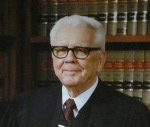
"If Eddie Boyle was born with a spoon in his mouth, it certainly wasn't a silver one," quipped his colleague and friend, the late Judge Adrian Duplantier. Judge Boyle was born October 11, 1913, in McDonoghville, now part of Gretna, across the Mississippi River from New Orleans. His father worked for the Texas-Pacific Railroad. He played baseball at Gretna High School and Loyola University and was scouted twice by major league teams. He turned down their offers because he wanted to practice law. He earned his law degree from Loyola in 1935 at the age of 21.
Judge Boyle was in private practice from 1935 until 1942 and served as Assistant United States Attorney from 1942 until 1945. He was a partner at Sehrt, Boyle and Wheeler from 1945 until 1966. On August 16, 1966, President Lyndon B. Johnson nominated him to the district court. Judge Boyle was confirmed by the Senate on October 20, 1966, and received his commission on November 3, 1966.
Prominent New Orleans attorney Gerald E. Meunier, Judge Boyle's law clerk from 1975 until 1977, observed: "He was a no-nonsense former prosecutor who could be at times, well, shall we say, a little gruff. But for me, there never was, and never could be, a person to wear the robe of Judge who was more decent and honorable than Edward J. Boyle, Sr. At a time when, as a new law graduate, I thought talent counted most in career, he taught me 'not in words, but in action' that dedication, thoroughness, and giving your best effort, counted far more. . . . He taught me, not in words, but in action that you can take the responsibility of a position seriously, without ever taking yourself so seriously that you forget why you're there. He never forgot."
Among his notable decisions is Koerner v. American Express Company, 444 F. Supp. 334 (E.D. La. 1977). Judge Boyle held that certain provisions of the Truth in Lending Act governing a credit card company's correction of billing errors did not apply to defendants, since the law's threshold requirement, the extension of consumer credit, was not satisfied because the account at issue was opened primarily for business purposes and not for personal use. The Fifth Circuit reversed Judge Boyle, 615 F. 2d 191 (5th Cir. 1980), but the United States Supreme Court reversed the Fifth Circuit, 454 U.S. 283, 101 S. Ct. 2281 (1981). On remand, the Fifth Circuit affirmed Judge Boyle for reasons set forth in his original opinion.
Judge Boyle took senior status on December 1, 1981, which allowed him to devote more time to his beloved family; his wife, Edie, his children Ed and Kathleen, and his grandchildren, Colleen and James Boyle and Bridgette and Lauren Lagarde -- and to his almost equally beloved recreational vehicles (he bought the first of five in 1965), which he delighted to tinkering with and in driving all over the United States, visiting national parks and making new friends along the way. Judge Boyle showed extraordinary grace, courage, and humor as infirmities, including failing eyesight, began to bedevil him in the late 1980s. He died in New Orleans, with his family at his side, on July 24, 2002 and is buried in Lakelawn Metairie Cemetery.
